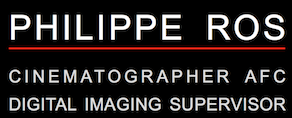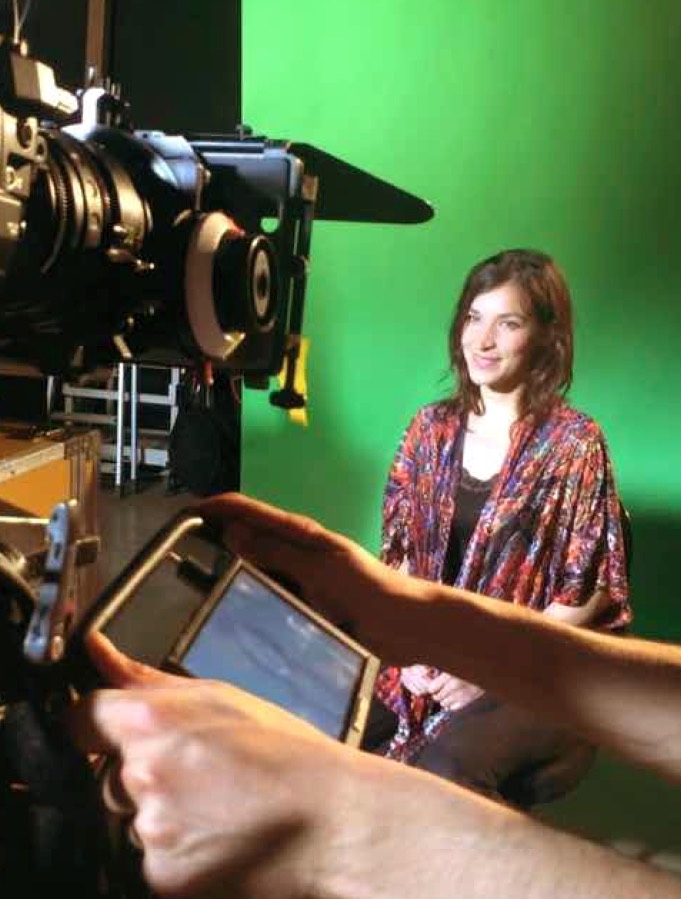PLEASE DOWNLOAD THE PFD FILE (BELOW LEFT) TO KNOW ALL ABOUT ROS INVOLVMENT AS INSTRUCTOR AND CONFERENCES HE GAVE ALL OVER THE WORLD.
Philippe has, for several years, been developing and giving workshops and seminars in a variety of subjects to do with digital technology in the film business.
Having honed his skills as a cinematographer in film, very early on his career Philippe became interested in the world of digital technology. This interest quickly progressed from telecine to colour grading to the processes of bridging analog and digital. He was a pioneer in France - 18 years ago - when he began matching film and digital and analyzing the internal workings of digital cameras.
A key period of intensive research and experience for Philippe started for him in 2004, when he was asked to work on the film - Oceans - which combined film and digital footage - to supervise the imaging of the project.
Oceans is a wildlife movie shot over 345 weeks - spread over almost 4 years (the film took nearly 6 years to complete) - utilizing a total 54 locations all over the world. It involved 7 teams and had a production budget of $ 75M. Philippe was involved from the beginning of the project right up until DCP’s releases.
The Oceans experience was seminal for Philippe because he could apply his knowledge of matching film and digital, film scan, film transfer, digital cameras and colour grading to redesign the whole workflow of the film with colourist and postproduction manager.
Crucially, this role meant that he had to work hand and glove with the producers/production management, in effect developing for himself a new role as consultant to both the technical and production sides of the filmmaking process.
In addition, he worked on the customising of all the digital cameras used on the picture - via management of gamma curves and internal settings - to deliver the highest quality scan film style.
Philippe was also the Dp on all the underwater, night and coral reef shooting of the film and also the shooting under the microscope. These areas of the film all posed very specific and difficult challenges. Philippe’s key role was to meet these challenges without compromise or budget overruns.
You can see several images and infos on innovations he has created on :
http://www.philipperos.com/content.php?id=7&page=1
http://www.philipperos.com/content.php?id=9&page=2
http://www.philipperos.com/content.php?id=10&page=2
When clicking on Technical details (below, right) you will find slides explaining the process
Since the completion of the film, Philippe has been invited to address many conferences around the world re how the film was made and what challenges were faced and how they were overcome.
In his workshops/seminars, Philippe uses Oceans as a « multi-entry » case study because of the richness of this particular production - which included, in its 500 hours of footage : aerial, studio, fiction/drama, underwater documentary and underwater studio.
In 2012, Ros explored the 4K potential with Olivier Garcia, engineer at HDSystems, Laurent Desbrueres senior colorist and Francois Dupuy technical manager at Digimage Cinema postproduction facility. Together they redesigned the whole Sony F65 digital workflwow in a serial of three short movies on robots directed by Ben Elia. The ‘Bot-Trilogy’, screened all over the world became a reference on 4K digital intermediate.
Philippe has continued to evolve his workshops and seminars - as the demands of the field change and his knowledge and experience of Digital Intermediate - and all its implications for Production - grow.
Philippe has recently launched the CWC (Camera, Workflow & Creativity) workshop designed for cinematographers. The proliferation of recording formats and image software often generates confusion and can waste time, distracting filmmakers and cinematographers from their focus on artistic challenges: i.e the choice of lenses, make-up, costumes, grading, etc Indeed, the artistic preparation of a film may only be initiated if the workflow is perfectly constructed. The workshop helps cinematographers to control their workflow and to create their film look. The fist CWC was held in Copenhagen in February 2016 with the support of DFF (Danish Association of Cinematographers).
He continues to design presentations to help producers, production managers, directors and, of course, cinematographers - to check if the technical choices made are to the highest creative standards possible within the parameters of the budget. These presentations comprise special case study comparisons, which normally include real footage and issues faced on actual film projects
For Philippe, it is crucial for all the technicians and the production team to understand that the final destination of the product should inform all the key choices one has to make on a project. His general film education and his focussed involvement in the digital process has helped him to design reliable, relevant methods to help relevant personnel choose between all the different paths they may be faced with on a film project.
More and more, the players on any film project team - from producers to production managers, cinematographers and even directors - are realising that they can’t use a conventional « chronological » approach to the production process (i.e.production >> postproduction >> exhibition) to determine their choices of formats, cameras or postproduction workflows. The Digital Age clearly requires something less confusing and more effective - not only because of creative demands it has generated but also the budgetry ones. The « way of the future » is fast becoming the way of the « here and now ».
Philippe Ros is:
Member of the French Cinematographers Association “AFC”
Honorary Member of the Canadian Society of Cinematographers "CSC’’
Consultant to the Technical Committee of “IMAGO”, European Federation of Cinematographers
See complete resume, demos, researches & infos on:
http://www.philipperos.com/

